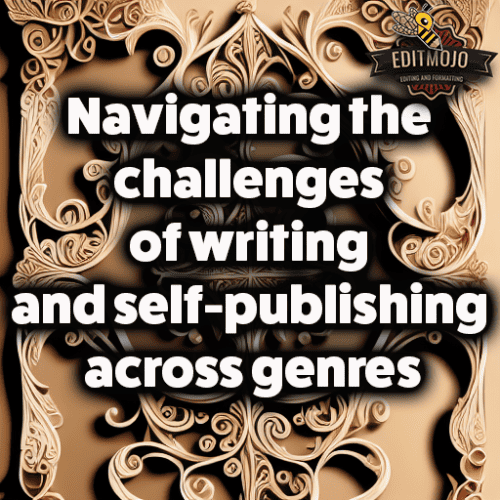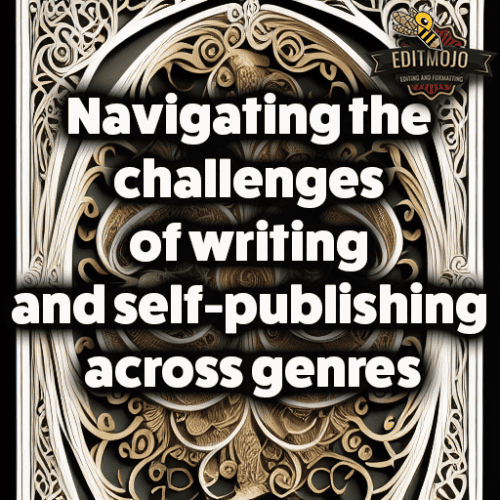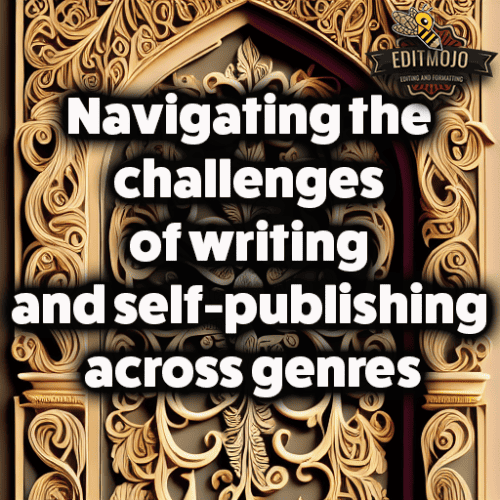Navigating the challenges of writing and self-publishing across genres
Navigating the challenges of writing and self-publishing across genres. Imagine literature as a vast sea, where each genre represents a unique current. From the thrilling rapids of action and adventure to the serene flow of romance, every genre offers a distinct flavor to the reader. For a writer, these currents represent a vast landscape of storytelling opportunities. But what happens when an author decides to navigate across these genre-currents? This creative voyage can be both rewarding and fraught with challenges. This article will discuss how authors can successfully navigate the challenges of writing and self-publishing across genres.
Key Takeaways Table
| Aspect | Key Takeaway |
|---|---|
| Understanding Genre | Genres shape a story’s structure, theme, and audience appeal. Understanding genre conventions is vital for authors. |
| Writing Across Genres | While offering creative freedom and wider readership, it presents challenges like managing reader expectations. |
| Versatile Writing Skills | Reading widely across genres and adopting different writing styles are crucial to successfully write across genres. |
| Self-Publishing | Self-publishing across genres involves careful branding, targeted marketing, and an effective cover design. |
| Successful Case Studies | Authors like J.K. Rowling and Hugh Howey have successfully navigated genre hopping, showcasing the viability of this path. |
Understanding Genre and Its Importance in Writing
Genres, in essence, are a form of categorization in literature. They help set the reader’s expectations about a book’s content, style, and theme. From literary fiction to fantasy, horror, and romance, each genre has its conventions and traditions that have been established over time.
In writing, genre acts as a guiding compass. It subtly dictates the story’s trajectory and appeals to a specific audience. Let’s take the mystery genre as an instance. Its readers anticipate suspense, clues, red herrings, and a satisfying resolution where the enigma is unravelled. If an author neglects these conventions, they might leave their readers perplexed and unsatisfied. Thus, understanding genre is an essential stepping stone in any writer’s journey.
The Perks and Pitfalls of Writing Across Genres
Why would an author choose to sail across multiple genre currents? There are numerous reasons. For some, it’s the lure of creative freedom, the desire to avoid being pigeonholed. For others, it’s an attempt to reach a broader readership. Think of J.K. Rowling, who has successfully authored children’s fantasy, adult mystery, and even screenplays.
Writing across genres offers a playground for creativity and expands an author’s narrative skills. However, it’s not without its perils. Authors risk confusing their readers or diluting their authorial brand. There’s also the challenge of mastering different genre conventions and reader expectations.
Developing Versatile Writing Skills
To successfully navigate the terrain of multiple genres, an author needs to be a literary chameleon. This means adopting different writing styles, tones, and storytelling methods. Reading widely across genres can provide a wealth of inspiration and knowledge. It’s like gathering a toolbox of techniques that can be employed as per the genre’s demand.

Managing Reader Expectations
To maintain a consistent author voice across genres while managing reader expectations is a delicate balancing act. It’s akin to changing costumes while maintaining your identity. Transparency is key here. Make it clear when you’re exploring a new genre and solicit feedback from your readers. Remember, it’s your unique voice and perspective that will keep your readers hooked, irrespective of the genre.
The Journey of Self-Publishing Across Genres
Self-publishing, often synonymous with freedom and control, presents its own set of challenges when you’re crossing genre lines. Here, you’re not just the writer but also the marketer, designer, and salesperson.
Branding and Marketing Considerations
When self-publishing across genres, it’s crucial to tailor your branding and marketing strategies to each genre’s audience. This might involve creating separate websites or social media profiles, crafting different author bios, or even considering a pseudonym.
Importance of Cover Design
The cover of your book is the first point of contact
with your potential reader. A fantasy book’s cover, adorned with mythical creatures or enchanted castles, will be vastly different from a romance novel’s cover, with its soft hues and intimate imagery. Hence, your book’s cover design should effectively communicate its genre.

Establishing a Robust Author Platform
Building a solid author platform is a vital part of self-publishing. From a website to social media presence, it’s about establishing a consistent brand across multiple touchpoints. This platform can be leveraged to communicate with readers about your genre switches.
Targeted Marketing Strategies
Effective marketing requires knowing your audience inside out. Each genre has a different reader demographic, and thus, requires a different marketing approach. This might involve targeted emails, genre-specific book promotions, or leveraging online platforms like Goodreads or Amazon’s Kindle Direct Publishing (KDP).
Case Studies of Successful Self-Published Authors Across Genres
A shining example of successful genre-hopping is Hugh Howey, author of the dystopian “Wool” series. After finding success in science fiction, he skillfully navigated the currents of fantasy, mystery, and even romance. His secret? Believing in the power of a good story that transcends genre constraints and resonates with readers.
Conclusion (Navigating the challenges of writing and self-publishing across genres)
Navigating the challenges of writing and self-publishing across genres is like sailing across a diverse sea of narratives. It’s not an easy voyage, but with the right skills, strategies, and spirit of exploration, it can be an immensely rewarding one. Embrace your creative freedom, respect your readers, and always keep learning and evolving. After all, the beauty of writing lies in its limitless potential for exploration and self-expression.

Additional Resources
To dive deeper into the topic, consider exploring books like “Writing in Multiple Genres: How and Why to Write Them” by Kristine Kathryn Rusch, and join online communities like Wattpad to interact with fellow authors who write across genres. You might also find platforms like Smashwords and Draft2Digital useful for self-publishing across multiple genres.
Top Five Questions & Answers (Navigating the challenges of writing and self-publishing across genres)
| Question | Answer |
|---|---|
| Why is understanding genre important in writing? | Understanding genre is important as it sets the reader’s expectations about the story’s content, style, and theme. Each genre has its conventions that authors should adhere to in order to satisfy their audience. |
| What are some benefits and challenges of writing across genres? | Benefits include creative freedom and the potential to reach a broader readership. Challenges include confusing readers, diluting the author’s brand, and mastering the conventions and expectations of different genres. |
| How can an author successfully navigate writing across genres? | By developing versatile writing skills, reading widely, and understanding different genre conventions. Authors also need to manage reader expectations effectively and maintain a consistent authorial voice. |
| What are some unique challenges in self-publishing across genres? | Unique challenges include branding and marketing considerations, creating effective cover designs for each genre, and establishing a robust author platform. Targeted marketing strategies for different genres are also crucial. |
| Are there any authors who have successfully self-published across genres? What can we learn from them? | Hugh Howey is a notable author who has successfully self-published across genres. His belief in the power of a good story, regardless of genre constraints, can inspire authors to explore writing across genres and engage readers with compelling narratives. |
